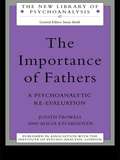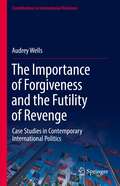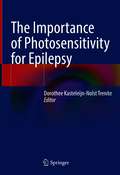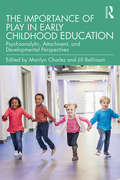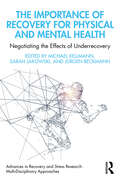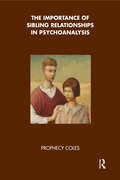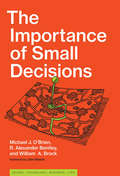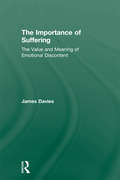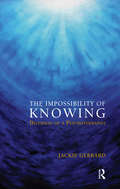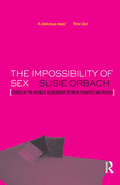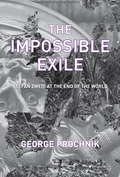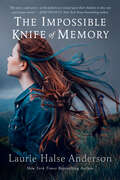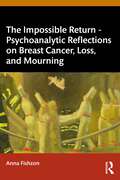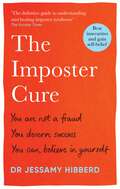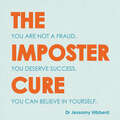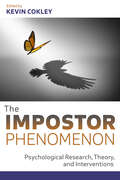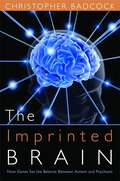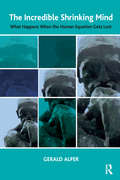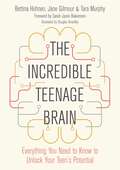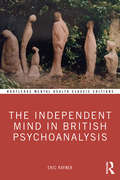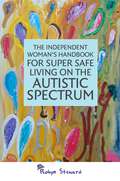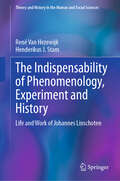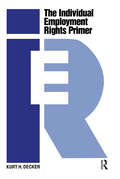- Table View
- List View
The Importance of Fathers: A Psychoanalytic Re-evaluation (The New Library of Psychoanalysis #Vol. 42)
by Judith Trowell Alicia EtchegoyenIt is widely acknowledged that children need structure, security, stability and attachment to develop and flourish, and that the father is an important part of this. Issues such as high divorce rates, new family structures, increased mobility, women's liberation and contraception are very common in society. This book sets out to explore what has happened to men and to fathers during all these changes and transitions. Judith Trowell and Alicia Etchegoyen, along with an array of renowned contributors, consider the importance of fathers in various situations, including: the role of the father at different stage of children's development the missing father loss of a father grandfathers. It is argued that the father is important, not only to support the main carer (usually the mother) but also to provide a caring, thinking, comfortable, confident presence.
The Importance of Forgiveness and the Futility of Revenge: Case Studies in Contemporary International Politics (Contributions to International Relations)
by Audrey WellsForgiveness is important in international politics because it can save thousands of lives. Its opposite, vengefulness, has played a significant part in various wars of the 20th and 21st centuries. These conflicts are examined in this book, showing how forgiveness could have avoided the tremendous ensuing bloodshed. Despite its importance, in the context of international relations, forgiveness as a means of preventing the outbreak of war (as opposed to facilitating reconciliation after conflicts) has largely been neglected as a subject of study. Indeed, it has also been ignored by politicians, as a result of which there are few examples of forgiveness to study compared with those of revenge. This book reflects this reality, but also seeks to change it by raising public awareness of the importance of forgiveness in international affairs and the need to demand that political leaders explore this avenue. The book also provides a succinct, informative guide to the background of today’s international affairs. Each chapter can be read independently and highlights either forgiveness in action or the futility and loss of life caused by vengefulness, demonstrating where and how forgiveness could have made a dramatic difference.
The Importance of Photosensitivity for Epilepsy
by Dorothee Kasteleijn-Nolst TreniteThis book offers a detailed account of all aspects of photosensitive epilepsy, including genetic testing, functional imaging (fMRI, MEG), pharmacological studies, animal studies, classification based on the occurrence of photoparoxysmal responses (PPRs) in different epilepsy syndromes, and the available prevention and treatment options. In addition, the comorbidity of and overlap between migraine and epilepsy are discussed. Informative case histories with EEG examples and a helpful glossary are included. In epilepsy, the term photosensitivity is used both for epileptic seizures triggered by flashing or flickering light and for epileptiform discharges evoked by intermittent photic stimulation (IPS) during an EEG recording. Most patients with a clear history of visually induced seizures will show epileptiform EEG discharges during IPS (PPRs). As epileptiform discharges can be evoked in photosensitive patients at any time, without triggering seizures, they can be considered a useful surrogate marker of the necessity and efficacy of epilepsy treatment. This book will serve as an ideal guide to the subject for pediatricians, (pediatric) neurologists, epileptologists, (child) psychiatrists, clinical geneticists, neuropsychologists, neuropharmacologists, occupational therapists, and basic scientists.
The Importance of Play in Early Childhood Education: Psychoanalytic, Attachment, and Developmental Perspectives
by Marilyn Charles Jill BellinsonThe Importance of Play in Early Childhood Education presents various theories of play and demonstrates how it serves communicative, developmental, and relational functions, highlighting the importance and development of the capacity to play in terms useful to early childhood educators. The book explicitly links trauma, development, and interventions in the early childhood classroom specifically for teachers of young children, offering accessible information that can help teachers better understand the meanings of children’s expressive acts. Contributors from education, psychoanalysis, and developmental psychology explore techniques of play, how cultural influences affect how children play, the effect of trauma on play, factors that interfere with the ability to play, and how to apply these ideas in the classroom. They also discuss the relevance of ideas about playfulness for teachers and other professionals. The Imprtance of Play in Early Childhood Education will be of great interest to teachers, psychoanalysts, and psychotherapists as well as play therapists and developmental psychologists.
The Importance of Recovery for Physical and Mental Health: Negotiating the Effects of Underrecovery (Advances in Recovery and Stress Research)
by Michael Kellmann Jürgen Beckmann Sarah JakowskiThis book offers a thorough and accessible look into the importance of recovery in both staying healthy and performing well, and highlights the detrimental effects of underrecovery on physical and mental health. Internationally renowned experts from psychology, physiology, sport medicine, health, and sport science offer interdisciplinary analysis of the effects of underrecovery as well as the use of applied intervention and prevention strategies. Over the last few decades, research in sports has provided numerous studies showing the importance of addressing recovery to find recovery-stress balance and build resources that help prevent illness and promote healthy living and well-being. Each chapter of this volume discusses a specific area of recovery, providing a collection of useful and practical lessons athletes and non-athletes can take forward in their training and beyond. Focusing on both research and applied counseling techniques to discuss recovery as an underestimated factor in physical and mental health, the book aims to enlighten readers on ways to incorporate recovery into their everyday lives to reduce stress and prevent injury. The book is written for the scientific community, applied health scientists, students, and interested readers. It draws on experiences and scientific findings from the field of sport to make them usable for an expanded understanding of recovery in the field of health and related areas such as the workplace.
The Importance of Sibling Relationships in Psychoanalysis
by Prophecy ColesThis book concentrates upon families where there is more than one child. It distinguishes between a sibling transference and a parent/child transference and illustrates the interweaving of the developmental strands between the two types of transference.
The Importance of Small Decisions (Design, Technology, Business, Life)
by Michael J. O'Brien R. Alexander Bentley William A. BrockHow people make decisions in an era of too much information and fake news. Humans originally evolved in a world of few choices. Prehistoric, preindustrial, and predigital eras required fewer decisions than today's all-access, always-on world of too much information. Economists have largely discarded the idea that agents act rationally and the market follows suit. It seems that no matter how small or innocuous a decision might seem, there's almost no way to guess the effect it might have. The authors of The Importance of Small Decisions view decisions and their outcomes from a different perspective: as key elements in the evolution of culture. In this trailblazing book, they examine different kinds of decisions and map the outcomes, both short- and long-term. Drawing on this, they introduce a map of social behavior that captures the essential elements of human decision-making. The authors look at the New England Patriots' decision in 2000 to draft an underachieving college quarterback named Tom Brady; they consider Warren Buffett's investment strategy; and they chart the “dancing landscape” of a college applicant's decision-making environment. Finally, they show that decisions can be ranked according to transparency of choice and social influence. When fake news seems indistinguishable from real news and when the internet offers a cacophony of voices, they warn, we can't afford to crowdsource our decisions.
The Importance of Suffering: The Value and Meaning of Emotional Discontent
by James DaviesIn this book James Davies considers emotional suffering as part and parcel of what it means to live and develop as a human being, rather than as a mental health problem requiring only psychiatric, antidepressant or cognitive treatment. This book therefore offers a new perspective on emotional discontent and discusses how we can engage with it clinically, personally and socially to uncover its productive value. The Importance of Suffering explores a relational theory of understanding emotional suffering suggesting that suffering, does not spring from one dimension of our lives, but is often the outcome of how we relate to the world internally – in terms of our personal biology, habits and values, and externally – in terms of our society, culture and the world around us. Davies suggests that suffering is a healthy call-to-change and shouldn't be chemically anesthetised or avoided. The book challenges conventional thinking by arguing that if we understand and manage suffering more holistically, it can facilitate individual and social transformation in powerful and surprising ways. The Importance of Suffering offers new ways to think about, and therefore understand suffering. It will appeal to anyone who works with suffering in a professional context including professionals, trainees and academics in the fields of counselling, psychotherapy, psychoanalysis, psychiatry and clinical psychology.
The Impossibility of Knowing: Dilemmas of a Psychotherapist
by Jackie GerrardThis is a book that assembles and integrates the author's clinical work and thinking over the many years of her working life. Part 1 focuses on patients with specific types of psychopathology and explores particular difficulties in technique and thinking. Part 2 addresses the issues of love, hate, and the erotic. In Part 3, specific challenges to the psychotherapeutic frame are demonstrated in chapters on enactments and on work with an absent patient. Richly illustrated throughout with clinical vignettes, above all, the author stresses the importance of the enquiring mind and the struggle not to "know" but to be ever ready to "not know" and to explore. The book should be of interest to qualified practitioners, to those who are training in psychodynamic or psychoanalytic work, and to anyone who has an interest in psychoanalysis and the "impossibility of knowing".
The Impossibility of Sex: Stories of the Intimate Relationship between Therapist and Client
by Susie OrbachIn this book I have struggled with certain words without a satisfactory conclusion. I am unhappy about all the words used to describe the person who visits the therapist's consulting room. Is she or he a patient? Well, sometimes yes. Certain individuals like that word because it captures for them the sense that there is something wrong, an emotional illness. Is she or he a client? Again, sometimes yes. Certain individuals like that word because it connotes a kind of consultative process. Is she or he an analysand? Certain individuals like this word because it conveys something about the process of a therapy and it has a symmetry: analyst–analysand. I myself find that all these words capture something about the therapy and the therapy process but are considerably less than perfect. In what follows I have chosen to use the words interchangeably, as well as the words psychotherapist, therapist and analyst. In the text, in the musings in italics, I have usually referred to the primary carer in the person's early life as mother. I realize that this is not always the case. There are fathers who have primary responsibility for their children from birth and there are relatives and nannies who fulfil this role. Rarely in my clinical experience of seeing adults has this role been an enterprise between two people in the way that it is becoming for some couples with children today. We have yet to see the effects of joint child-rearing on adult psychologies so I have retained the notion of the mother or mother substitute, a notion which will have to be expanded as the generations now raising children make new arrangements between them. I have also chosen for simplicity's sake to use the word 'she' throughout for the personal pronoun rather than 'she or he'.
The Impossible Exile
by George ProchnikAn original study of exile, told through the biography of Austrian writer Stefan Zweig By the 1930s, Stefan Zweig had become the most widely translated living author in the world. His novels, short stories, and biographies were so compelling that they became instant best sellers. Zweig was also an intellectual and a lover of all the arts, high and low. Yet after Hitler's rise to power, this celebrated writer who had dedicated so much energy to promoting international humanism plummeted, in a matter of a few years, into an increasingly isolated exile--from London to Bath to New York City, then Ossining, Rio, and finally Petrópolis--where, in 1942, in a cramped bungalow, he killed himself. The Impossible Exile tells the tragic story of Zweig's extraordinary rise and fall while it also depicts, with great acumen, the gulf between the world of ideas in Europe and in America, and the consuming struggle of those forced to forsake one for the other. It also reveals how Zweig embodied, through his work, thoughts, and behavior, the end of an era--the implosion of Europe as an ideal of Western civilization.
The Impossible Knife of Memory
by Laurie Halse Anderson<P>For the past five years, Hayley Kincaid and her father, Andy, have been on the road, never staying long in one place as he struggles to escape the demons that have tortured him since his return from Iraq. <P>Now they are back in the town where he grew up so Hayley can attend school. <P>Perhaps, for the first time, Hayley can have a normal life, put aside her own painful memories, even have a relationship with Finn, the hot guy who obviously likes her but is hiding secrets of his own. <P>Will being back home help Andy's PTSD, or will his terrible memories drag him to the edge of hell, and drugs push him over?
The Impossible Return – Psychoanalytic Reflections on Breast Cancer, Loss, and Mourning
by Anna FishzonThe Impossible Return – Psychoanalytic Reflections on Breast Cancer, Loss, and Mourning is a work of creative nonfiction and autotheory. It is part cancer memoir, part psychoanalytic theorizing, and part history of late Soviet Ukraine.Anna Fishzon’s personal narrative is interspersed with interludes exploring other “reconstructions” (Chernobyl’s sarcophagus, the perestroika years) as well as psychoanalytic reflections on anxiety, prosthesis, hypochondria, and tattooing. The authorial voice is intentionally polyphonic: elegiac, humorous, at times academic and philosophical. Each chapter is set in the context of the writing process, with discussion of the Covid-19 pandemic and war in Ukraine. The prologue examines the psychoanalyst’s bodily presence in treatment and includes clinical vignettes that discuss the impact of remote therapy sessions during lockdown, and an epilogue provides a meditation on repetition compulsion and the impossibility of mourning fully.Through theoretical and personal reflections on mourning and recovery after catastrophic collapses of psyche, body, and place, this book makes original contributions to psychoanalysis, Slavic and cultural studies, trauma studies, film criticism, and history. This unique work will be relevant to readers interested in psychoanalytic studies, cancer and disability studies and critical theory, and academics of autotheory and memoir.
The Imposter Cure: Beat insecurities and gain self-belief
by Dr Jessamy HibberdA newly updated edition for 2024'You've definitely heard of it, you've almost certainly felt it and it's actively stopping you from being your best self. In a new book on imposter syndrome Dr Jessamy Hibberd provides a definitive guide to understanding and tackling the psychological mind trap.' - The Sunday Times 'Dr Jessamy teaches you the tools to break free from those self-sabotaging thought patterns that are holding you back from your own success.' - Hazel Wallace, The Food Medic'If you suffer from imposter syndrome, this is definitely a must-read!' - Goodreads reviewer'I have suffered with imposter syndrome my entire life [...] In the few days I have been reading this book I have done an almost complete 180.' - Goodreads reviewerImposter syndrome is a phenomenon in which people believe they are not worthy of success. They convince themselves that they have done well due to luck and are terrified their shortcomings will eventually be exposed, making it impossible to enjoy their accomplishments. The Imposter Cure explores the psychological impact of imposter syndrome and exposes the secrets fears and insecurities felt by millions of men and women. Dr Jessamy Hibberd provides sound expert advice to help the reader better understand the problem and overcome it, so they think differently, gain self-belief and learn to see themselves as others do. Filled with case studies to bring the concepts alive and packed with strategies to increase confidence, this book is a must-read for anyone who has struggled with their achievements.
The Imposter Cure: Beat insecurities and gain self-belief
by Dr Jessamy HibberdA newly updated edition for 2024'You've definitely heard of it, you've almost certainly felt it and it's actively stopping you from being your best self. In a new book on imposter syndrome Dr Jessamy Hibberd provides a definitive guide to understanding and tackling the psychological mind trap.' - The Sunday Times 'Dr Jessamy teaches you the tools to break free from those self-sabotaging thought patterns that are holding you back from your own success.' - Hazel Wallace, The Food Medic'If you suffer from imposter syndrome, this is definitely a must-read!' - Goodreads reviewer'I have suffered with imposter syndrome my entire life [...] In the few days I have been reading this book I have done an almost complete 180.' - Goodreads reviewerImposter syndrome is a phenomenon in which people believe they are not worthy of success. They convince themselves that they have done well due to luck and are terrified their shortcomings will eventually be exposed, making it impossible to enjoy their accomplishments. The Imposter Cure explores the psychological impact of imposter syndrome and exposes the secrets fears and insecurities felt by millions of men and women. Dr Jessamy Hibberd provides sound expert advice to help the reader better understand the problem and overcome it, so they think differently, gain self-belief and learn to see themselves as others do. Filled with case studies to bring the concepts alive and packed with strategies to increase confidence, this book is a must-read for anyone who has struggled with their achievements.
The Imposter Cure: How to stop feeling like a fraud and escape the mind-trap of imposter syndrome
by Dr Jessamy HibberdImposter syndrome is a phenomenon in which people believe they are not worthy of success. They convince themselves that they have done well due to luck and are terrified their shortcomings will eventually be exposed, making it impossible to enjoy their accomplishments.You've Got This explores the psychological impact of imposter syndrome and exposes the secrets fears and insecurities felt by millions of men and women. Dr Jessamy Hibberd provides sound expert advice to help the reader better understand the problem and overcome it, so they think differently, gain self-belief and learn to see themselves as others do. Filled with case studies to bring the concepts alive and packed with strategies to increase confidence, this book is a must-read for anyone who has struggled with their achievements."I still have a little imposter syndrome, it never goes away, that you're actually listening to me... I share that with you because we all have doubts in our abilities, about our power and what that power is." Michelle Obama"There are still days when I wake up feeling like a fraud, not sure I should be where I am." Sheryl Sandberg"When I receive recognition for my acting, I feel incredibly uncomfortable. I tend ot turn in on myself. I feel like an imposter." Emma Watson(p) 2019 Octopus Publishing Group
The Impostor Phenomenon: Psychological Research, Theory, and Interventions
by Kevin CokleyThis book offers a scientific investigation into the impostor phenomenon, a concept that has long been misunderstood in popular culture. Much of the conventional wisdom about the impostor phenomenon is driven by intuitive, common-sense based recommendations about how to cope with and conquer impostor feelings. Unfortunately, much of this discourse is neither rooted in nor informed by empirical research. There are many important theoretical and methodological questions regarding the impostor phenomenon that remain unanswered, such as whether the impostor phenomenon is a personality trait at the core of one's identity, or merely a predisposition triggered by circumstances or fears of being evaluated. This book describes the theoretical underpinnings of the impostor phenomenon along with common measurement issues, implications for mental health and achievement, its relative prevalence among various population groups, and practical applications of the concept in psychotherapy and mental health treatment more broadly.
The Impostor Phenomenon: Psychological Research, Theory, and Interventions
by Kevin CokleyThis book offers a scientific investigation into the impostor phenomenon, a concept that has long been misunderstood in popular culture. Much of the conventional wisdom about the impostor phenomenon is driven by intuitive, common-sense based recommendations about how to cope with and conquer impostor feelings. Unfortunately, much of this discourse is neither rooted in nor informed by empirical research. There are many important theoretical and methodological questions regarding the impostor phenomenon that remain unanswered, such as whether the impostor phenomenon is a personality trait at the core of one's identity, or merely a predisposition triggered by circumstances or fears of being evaluated. This book describes the theoretical underpinnings of the impostor phenomenon along with common measurement issues, implications for mental health and achievement, its relative prevalence among various population groups, and practical applications of the concept in psychotherapy and mental health treatment more broadly.
The Imprinted Brain: How Genes Set the Balance Between Autism and Psychosis
by Christopher BadcockThe Imprinted Brain sets out a radical new theory of the mind and mental illness based on the recent discovery of genomic imprinting. Imprinted genes are those from one parent that, in that parent's interest, are expressed in an offspring rather than the diametrically opposed genes from the other parent. For example, a higher birth weight may represent the dominance of the father's genes in leading to a healthy child, whereas a lower birth weight is beneficial to the mother's immediate wellbeing, and the imprint of the mother's genes will result in a smaller baby. According to this view, a win for the father's genes may result in autism, whereas one for the mother's may result in psychosis. A state of equilibrium - normality - is the most likely outcome, with a no-win situation of balanced expression. Imprinted genes typically produce symptoms that are opposites of each other, and the author uses psychiatric case material to show how many of the symptoms of psychosis can be shown to be the mental mirror-images of those of autism. Combining psychiatry with insights from modern genetics and cognitive science, Christopher Badcock explains the fascinating imprinted brain theory to the reader in a thorough but accessible way. This new theory casts some intriguing new light on other topics as diverse as the nature of genius, the appeal of detective fiction, and the successes - and failures - of psychoanalysis. This thought-provoking book is a must-read for anyone with an interest in autism, psychiatry, cognitive science or psychology in general.
The Incredible Shrinking Mind: What Happens When The Human Equation Gets Lost
by Gerald AlperExamining the assertions and fallacies of the theories conceived (or contrived) by some of today's most brilliant scientists and thinkers (including Dan Ariely, John Barrow, Pascal Boyer, Frank Close, Nicholas Humphrey, Richard Dawkins, Stanley Milgram, Oliver Sacks, and Carl Sagan), the author explores why these varied attempts at joining the world of experience and the world of measurement so regularly fail, how consciousness explained is really a concentrated effort to explain away the subjective phenomena of consciousness. From the psychic rat to the gorilla in the room, from British double-agent Kim Philby to comedian Steve Martin, The Incredible Shrinking Mind not only offers a provocative and entertaining critique, but also a profound and practical solution: the psychodynamic approach, which takes seriously the question of meaning and not solely observable behaviour, which combines the quantitative and the experimental with the human and multidimensional, which seeks to understand not just how but why.
The Incredible Teenage Brain: Everything You Need to Know to Unlock Your Teen's Potential
by Tara Murphy Bettina Hohnen Jane GilmourThis book is a must read for anyone parenting, teaching or supporting teens, who wants to empower them to reach their potential. Written by a team of clinical psychologists, it leads you through tried and tested strategies to build strong relationships and improve communication with young people as they develop, learn and grow. In the book we learn that the 'teenage brain' is unique which gives us an incredible opportunity for change and development, but it is also a time when young people are particularly sensitive and potentially vulnerable . It guides you through ways to communicate effectively with teens without negatively affecting their self-esteem. There are plenty of tips about what to say, what not say and the best mindset to use with teens, day to day.The authors draw from the latest research in neuroscience and psychology, years of clinical expertise and first-hand parenting experience. It's relatable like your best friend's advice, and informed by scientific evidence - easy to read, hard to put down.
The Independent Mind in British Psychoanalysis (Routledge Mental Health Classic Editions)
by Eric RaynerArguably the most informative and readable account of the development of British independent psychoanalysis, Eric Rayner’s The Independent Mind in British Psychoanalysis offers a coherent account of the core concepts that influence the clinical practice. Covering the main themes and theorists with rigour and clarity, it has rightly found a central place on the reading lists of psychoanalytic and psychotherapy trainings, both in the UK and worldwide. Republished with a new foreword from Maurice Whelan, the book begins with a philosophical and historical background, describing the establishment of the ‘Middle Group’ (later called the Independents) following the controversial discussions between the supporters of Melanie Klein and Anna Freud. The succeeding chapters detail the contributions by Independent psychoanalysts including Fairbairn, Balint, Rickman, Winnicott, Bowlby, and Khan, to themes such as emotions, object relations, sexuality, aggression, perversion, regression, symbolisation, creativity, art, and dreams. Rayner relays the ethos of the Independent psychoanalytic ‘mind’ as tolerant, creative and respectful, with an understanding of the developmental roots of pathology in early relationships and with balanced thinking about the impact of the real environment as well as the internal world on a person’s character. Providing a thorough exploration of the development of thinking within the tradition of the British Independent school of psychoanalysis, this book will be of great interest to psychoanalysts, psychotherapists, counsellors, social workers, students, and even non-clinicians interested in the history of psychoanalysis.
The Independent Woman's Handbook for Super Safe Living on the Autistic Spectrum
by Robyn StewardCertain characteristics of autism, such as difficulty understanding social cues, may make women vulnerable to potentially dangerous situations. Robyn Steward has written this supportive guide to help all women on the autistic spectrum live independently, make their own choices in life, and be safe whilst doing so. This book will provide you with the knowledge to recognise potential risks to your personal safety and the skills and strategies required to avoid and overcome them. Informed by a survey of, and interviews with, women on and off the autistic spectrum, it explores common safety issues encountered by women and offers practical advice to help you stay safe and supported in your independence. Topics covered include friendships, relationships and sex, alcohol and drugs, money and employment and staying safe outside the home and online. This handbook is your guide to super safe living as an independent woman and will help you to stay safe whilst living life to the full. It may also be of interest to your family, friends and carers, giving them insight into life on the spectrum and confidence that you will enjoy your independence in an informed and safe manner.
The Indispensability of Phenomenology, Experiment and History: Life and Work of Johannes Linschoten (Theory and History in the Human and Social Sciences)
by Henderikus J. Stam René Van HezewijkThis book is the first comprehensive intellectual biography of Johannes Linschoten, whose work has been credited with helping to bring down the Utrecht School of phenomenological psychology. The authors show this to be a mistaken assumption in the light of Linschoten’s entire oeuvre and demonstrate his importance for an understanding of a phenomenological psychology that necessarily coexists with an experimental, scientific psychology. In the Netherlands, Linschoten is particularly appreciated for his last book, published posthumously. That volume, Idols of the Psychologist, took a critical look at phenomenological psychology and its pretensions while simultaneously acknowledging that a phenomenological outlook is a necessity for beginning any kind of experimental investigation. Most commentators on this book considered Linschoten a convert from phenomenology to experimental psychology, but have either ignored his earlier, substantive work or have not seen the importance of the intellectual context for his final work. By examining his life and the full extent of his voluminous writings, this book demonstrates Linschoten’s importance for the development of psychology in the Netherlands and beyond. It will shed new light on the life and work of Johannes Linschoten as well as the Dutch school of phenomenology and its postwar contributions to psychology in Europe and North America. Furthermore, for the first time, this book brings together important aspects of Linschoten’s life with his prodigious output. It demonstrates how his life and work created a unique psychology that deserves to be continued and developed.
The Individual Employment Rights Primer
by Kurt H. DeckerA guide to employment law. One of the most rapidly evolving areas of law involves individual employment rights. Individual employment rights has no clearly defined boundary. It encompasses a multitude of employment statutes and court decisions. It finds its support in constitutional law and has developed as part of specialized employment law areas involving record keeping and disclosure, labor relations, health and safety, labor standards, fair employment practices. This book consolidates these fragmented individual employment rights into a centralized reference source.
